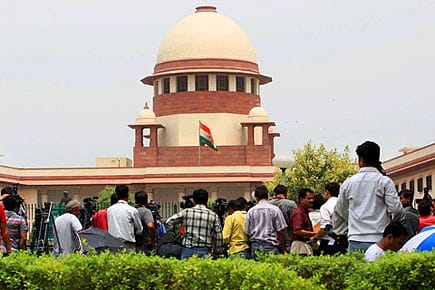Let Justice, Not Populism, Prevail

The Allahabad High Court's verdict was a classic case of exceeding the brief
Less than a month ago, while delivering a lecture on 'Canons of Judicial Ethics', Chief Justice of India SH Kapadia cautioned fellow judges against judicial overreach. The Judiciary, he said, should refuse to act as a "super-legislature". Justice Kapadia's observations, which he said were made as a student of law rather than as the country's Chief Justice, speak for themselves. They also tell us that judges, irrespective of the popular view on matters they adjudicate on, should always remain good students of law: "We, judges, should remember that the validity of our decisions cannot rest on popularity. Resisting the pressure to please the majority is the strength of the Judiciary, not its weakness. Judges inevitably end up in the political arena in deciding controversial cases—whichever side they rule… We are not concerned with the wisdom, need or appropriateness of the legislation. We must refuse to sit as a super-legislature to weigh the wisdom of legislation," he said.
In staying the Allahabad High Court's 30 September 2010 judgment on the Ayodhya title suit that ordered a three-way division of the 2.77 acres of disputed land, the Supreme Court's two-judge bench upheld the spirit of Justice Kapadia's words of caution. The Chief Justice of India was only reminding his peers of the powers that the Constitution bestows upon them and the limits they must observe.
On 9 May, while staying the Allahabad High Court's verdict, the Supreme Court bench observed—in an interim order that came on the very first hearing—that it found the High Court's verdict both strange and surprising. The bench, comprising Justices Aftab Alam and RM Lodha, termed the High Court's judgment "something strange" because a partition of the land was ordered despite none of the parties to the dispute seeking one. This is crucial. The court was not approached for a compromise, but a ruling on who the disputed land on which the Babri Masjid stood before 6 December 1992 belonged to. The High Court's decision was a classic case of overreach. Justice Lodha observed: "The High Court's judgment is something strange. A new dimension has been given [to the case] by the High Court, as the decree of partition was not sought by the parties. It was not prayed for by anyone. It has to be stayed. It's a strange order…
Imran Khan: Pakistan’s Prisoner
27 Feb 2026 - Vol 04 | Issue 60
The descent and despair of Imran Khan
Such kind of decrees cannot be allowed to be in operation. It is a difficult situation now. The position is that the High Court verdict has created a litany of litigation."
The High Court, in a majority order, had divided the land equally between the Sunni Wakf Board, the Nirmohi Akhara and the side representing Ram Lalla. In its appeal to the Supreme Court against the High Court's order, the Wakf Board contended that the suit was decided on the basis of the belief or faith of a section of the Hindu community for which there was no admissible evidence and that the court had wrongly held that a temple existed at the site in dispute before the construction of the Babri Masjid. There was no evidence to prove the existence of any such temple or its demolition in or around 1528 AD. It argued that the claims of Muslims, Hindus and the Nirmohi Akhara on the disputed site were mutually exclusive, and thus could not be shared. The High Court's three judge bench overlooked both the forcible installation of idols in 1949—which the court had examined at length—and the December 1992 demolition, while partitioning the land in question. The first title suit had sprung from the 1949 action of installing idols.
Despite the fact that the High Court bench chose to ignore the illegalities of the actions of 22 December 1949 and 6 December 1992, and accord an unstated approval to the criminal actions of those claiming to represent the majority, a section of TV studio experts who hop from one studio to another every evening and counsel the world on how to run itself said the HC's judgment was a landmark one. These 'intellectuals' showed scant regard for the Constitution. Instead, they lauded the High Court's overreaching its brief as an evolutionary step in Indian jurisprudence.
The Supreme Court's interim order has set the record straight and reminded the Judiciary that it draws its power from the Constitution, not populism. As for the TV 'intellectuals', expect them to now laud the Supreme Court's interim order just like they did the Allahabad High Court verdict.
